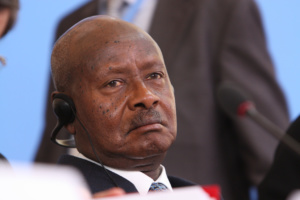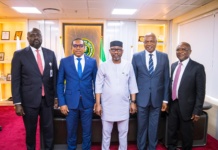Oil companies – Total E&P, Tullow Oil and CNOOC – are locked in a bitter fight for control of Uganda’s oil sector. The coveted prizes are deals worth about $20 billion.

The three entered a partnership in 2012 when Tullow Oil, which was the sole exploration company farmed down 66% of its stake, in equal 33% portions each, to the Chinese and French biggies. The Irish minnow bagged $2.9 billion in the farm-down and still retained a 33.3% stake in the deal. Up to that point, it looked like a great deal.
But insiders tell The Independent that if the three companies do not resolve their current disagreements, their joint venture might collapse, and Uganda’s bid to start oil production might be delayed once again.
The French company and the Chinese have been squabbling over control at almost every turn since the government allowed them to acquire stakes in the oil fields from Tullow. With the coming production phase and the prospect of mega oil deals, the fights appeared to intensify this November.
The Independent has learnt that senior executives from the companies have had to seek frantic meetings with President Yoweri Museveni to resolve their issues.
The Independent has learnt that Total S.A’s Vice President for Africa, Guy Maurice and another top official flew into Kampala mid-November to meet the President.
Sources say Maurice’s delegation camped in Kampala for about half a week until it met the president. It was the second time Maurice was coming into town in a few months.
And his meeting followed another by CNOOC’s Vice-President Xu Keqiang from China, who together with the Chinese ambassador, met Museveni and raised concerns over Total.
The Independent understands that Total’s delegation after meeting Museveni “left unhappy”.
Sources have told The Independent that Tanzanian President John Pombe Magufuli and Equatorial Guinea’s Teodoro Obiang Nguema have cautioned Museveni to tread carefully on Total.
Magufuli and his technocrats disagreed with Total officials during the negotiations for the pipeline and Equatorial Guinea revealed in August that Total misrepresented fuel sales figures in a fraud case in which Equatorial Guinea now demands 73 million euros from Total. The incident reportedly occurred between 2010 and 2012.
It is not yet clear whether these concerns have had a chilling effect on Museveni’s relationship with the French giant.
Insiders say, this information might feed into Museveni’s decision regarding the fight between CNOOC and Total.
The current fight was sparked by a $ 900 million deal in which Tullow Oil is selling 22 percent of its 33.3 percent stake after being frustrated by Museveni’s decision to build the Ugandan oil pipeline to the Indian Ocean through Tanzania instead of through Kenya.
Tullow Oil, which also operates oil fields in Kenya, was lobbying for the Kenyan route because this would allow it transport both its Uganda and Kenya oil cheaply and conveniently. On its part, CNOOC stood to secure the pipeline construction deal for Chinese companies.
Total, on the other hand, was pushing for the Tanzanian route through the port of Tanga and demonstrated, through a feasibility study carried out by Houston-based Gulf Interstate, that this route was easy to complete, and safer and cheaper to operate.
The Total study, upon which Museveni based his decision, showed that the Lamu port was insecure because it lies near the border with Somalia, which is al-Shabaab terrorist group territory. The study also showed that the Lamu port required more work compared to the Tanga port which is already operational. Unlike in Kenya, land acquisition would be easier in Tanzania as land there is owned by the state unlike in Kenya where land is owned by individuals and its acquisition tends to be disrupted by compensation disputes.
On top of all this, the cost of the Lamu route had been estimated to be US$5.1 billion compared to $3.55 billion for the Tanga route.
Total also promised to mobilise the finance for the construction of the pipeline and, as an inducement, pledged to contribute 10% towards the cost of President Museveni’s US$4.5 billion oil refinery on the shores of Lake Albert. A group led by General Electric and another led by China’s Dongsong Guangzhou Energy Group are competing for the deal after negotiations with Russian firm Global Resources collapsed in 2015. With all these pledges Total won the fight over the pipeline.
Although Total won the battle, the war is still raging. A few months ago, CNOOC flew in their Vice President, Xu Keqiang, to meet Museveni over concerns with Total.
Apparently, apart from disagreements over the implementation and financing of the pipeline, CNOOC was unhappy that while in Tanzania to launch the pipeline works in August, Total officials blocked a high powered Chinese delegation from meeting Museveni. Matters were not helped that Total had snatched the Pipeline deal from under CNOOC’s belly.
Meanwhile, with the pipeline going through Tanzania, cash-strapped Tullow was left in a latch. Without much interest left in Uganda, Tullow decided to reduce its footprint in the country even further; the reason it is farming out. But Tullow’s move now appears to have emboldened the Chinese to take on Total.
As part of this fight, CNOOC is now demanding operatorship of Exploration Area 2 (EA2), the same area Tullow had already agreed to sell to Total. In March, CNOOC notified Tullow that it was exercising its right to acquire 50% of the interest Tullow is transferring to Total. The case has gone to President Museveni.
Abdul M Kibuuka, the Public Affairs and National Content Manager of Tullow Uganda, confirmed to The Independent that the companies had concluded negotiations and entered an agreement.
Kindly follow us on twitter:@AfricanVoice2










